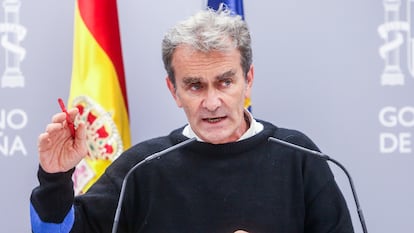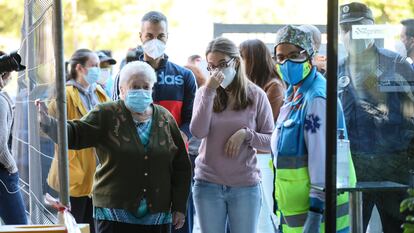Health Ministry reports 12,400 new coronavirus cases and 126 fatalities
Authorities call for Madrileños to act responsibly after restrictions on movement are struck down by the Madrid High Court
The Health Ministry on Thursday reported 12,400 new coronavirus cases in Spain, taking the total number of confirmed infections since the start of the pandemic to 850,000. The daily increase is the second highest seen so far in this second wave of the health crisis, only behind the figure reported on September 18.
According to Fernando Simón, the director of the Health Ministry’s Coordination Center for Health Alerts (CCAES), the situation in the country “is moving toward stabilization,” despite infection rates remaining high. “The evolution is not favorable,” he said on Thursday night at a press conference to present the latest coronavirus figures, in reference to the situation in Spain and the majority of European countries, all of which are seeing rises in indicators.
Simón’s appearance last night was overshadowed by the ongoing battle between the central government and the Madrid authorities over the restrictions that should be implemented in the region, which has once again become the epicenter of the crisis in Spain. Simón refused to offer an opinion on the Madrid High Court’s decision to strike down the perimetral confinement that the central government had forced on 10 cities in the Madrid region, despite the opposition of the regional administration, but he did call on “the individual responsibility of citizens” to avoid making unnecessary journeys and reduce social contact as much as possible. “If there is no reduction in mobility, there could be an increase in cases,” he warned.

The 14-day cumulative number of coronavirus cases per 100,000 inhabitants in Spain came in at 257 in Thursday’s report, slightly down on last week’s figure. Simón explained that this data point varies greatly from region to region, being highest in Navarre, with 655 cases, followed by Madrid, which registered 563. The Canary Islands, meanwhile, is at the opposite end of the scale, and is the only region with an incidence below 100 cases per 100,000 inhabitants.
The report saw 126 Covid-19-related fatalities added to the total, with 421 registered in the last seven days. The official coronavirus death toll in Spain now stands at 32,688, but this does not include the thousands of undiagnosed fatalities from the first wave. According to data from Spain’s civil registries, there have been 53,000 excess deaths in the country between March and September.
The remainder of the most important indicators have been relatively stable over the last week. Positivity rates – the proportion of PCR coronavirus tests that come back positive – have fallen one point to 10.1% in the last seven days. Pressure on the healthcare system, meanwhile, has hardly changed: 9% of Spain’s hospital beds are currently occupied by coronavirus patients, a percentage that doubles in terms of intensive care unit (ICU) bed occupation.

The data from Madrid, the region that is of greatest concern to the Health Ministry, has shown a trend of improvement over recent days, although the levels of infection are still very high. One in every four new cases in Spain is being registered in the region, and the rates continue to be above the levels considered to be “extreme” by the Health Ministry, according to documents presented in recent days.
Simón said he was cautious about judging this improvement given the “reporting delays” that the data from Madrid is suffering, but he did admit that “a certain stabilization can be observed,” something he classed as being “very positive.”
The CCAES director added that new rapid antigen tests are having a greater influence on the detection of new cases in some regions, and also recognized that infections are growing among seniors, the section of society that is most vulnerable to the virus. “While it is a very small percentage, if incidence grows, cases will grow [among this collective],” he explained. Despite this, he said that contingency plans in senior residences to combat the virus “are working well in general.”
English version by Simon Hunter.
Tu suscripción se está usando en otro dispositivo
¿Quieres añadir otro usuario a tu suscripción?
Si continúas leyendo en este dispositivo, no se podrá leer en el otro.
FlechaTu suscripción se está usando en otro dispositivo y solo puedes acceder a EL PAÍS desde un dispositivo a la vez.
Si quieres compartir tu cuenta, cambia tu suscripción a la modalidad Premium, así podrás añadir otro usuario. Cada uno accederá con su propia cuenta de email, lo que os permitirá personalizar vuestra experiencia en EL PAÍS.
¿Tienes una suscripción de empresa? Accede aquí para contratar más cuentas.
En el caso de no saber quién está usando tu cuenta, te recomendamos cambiar tu contraseña aquí.
Si decides continuar compartiendo tu cuenta, este mensaje se mostrará en tu dispositivo y en el de la otra persona que está usando tu cuenta de forma indefinida, afectando a tu experiencia de lectura. Puedes consultar aquí los términos y condiciones de la suscripción digital.









































